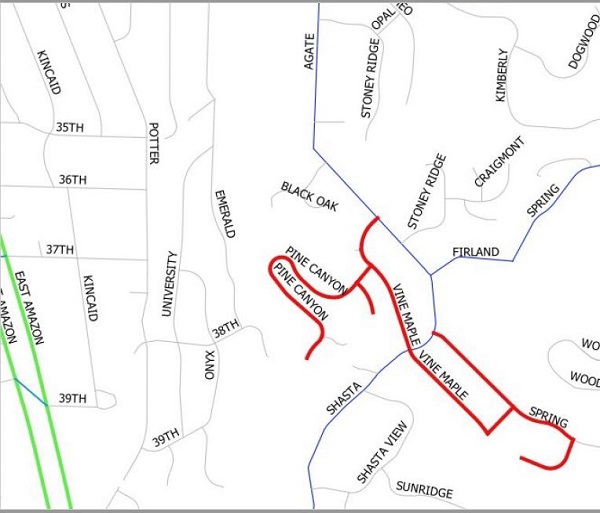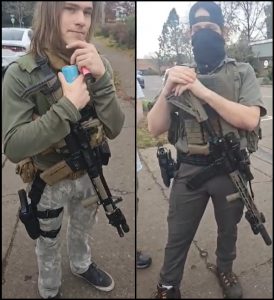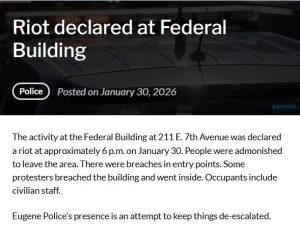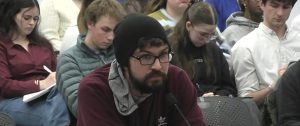Southeast Neighbors still waiting for answers on streets bond
8 min read
Southeast Neighbors want to know how streets are selected for the bond issue appearing on the ballot this November. From the NLC Transportation meeting in June, Jess Roshak.
[00:00:10] Jess Roshak: And Rob Inerfeld is going to be presenting this evening on a bond measure that we wanted to hear about.
[00:00:18] Rob Inerfeld: The voters of Eugene have passed three five-year bond measures starting in 2008, and so each bond measure paid primarily for paving our streets, but also had a set-aside for active transportation. The first one set aside $350,000 a year for rehabilitating shared use paths. The second one set aside half a million a year. That was more flexible that could be used for not just rehabilitating paths, but other kinds of walking and biking projects. And then this, the third one increased that $2 million a year. And that’s where we are now.
[00:00:48] They’re each for five years and we the taxpayers pay them off, like, as we go. So we call them bonds, but I’ve been told they’re more, almost like a line of credit because we pay them off right away, which is kind of, I think that’s kind of neat.
[00:01:01] The one that we’re currently under will be done in ‘23 or ‘24, we’re kind of stretching it out an extra year, but basically in ‘23, it’ll have been another five years since the last one.
[00:01:11] So we’ve had this pretty much the same tax rate for each bond measure. I’ve already explained how we set aside some funds for walking and biking. And then the one really good thing is, the walking and biking funds can actually leverage a lot of other grants that we get. So it really brings a lot more money to our community, for walking and biking projects.
[00:01:29] And so what we’re proposing for the new bond measure is again, to have the same tax rate, the focus on pavement preservation, but setting aside significant funds for walking biking safety. So we’re looking at broadening out what the set-aside funds would be for, not just for walking and biking, but other kinds of safety projects and neighborhood livability, which could include things like street lighting and traffic calming, and then leverage again, leveraging other funding.
[00:01:52] So what we try to do is we’ll often bring other funding to the table and try to integrate improvements to walking and biking into the projects that we’re building, ‘cause it’s more cost effective to enhance the street when you’re paving it, because you already have the construction crews out there, and it’s also less disruptive to property owners and residents and businesses to make any other improvements.
[00:02:12] So the other thing about folks may not be aware of is, there’s a bunch of sustainability things we do as part of our standard practice of our paving projects. So we use recycled asphalt. We use warm mix asphalt, which gives us less what are called VOCs and it’s less energy intensive to produce. We’ve been doing more to integrate street tree plannings into our project and where we can, we try to reduce the amount of impervious surface.
[00:02:38] One of the things we try to do is to make sure that we have paving projects all around Eugene. So that’s important to have that geographic distribution. So for the paving projects for the ballot measures, we’ve always had the actual list of streets that we would be paving that would be, and that’s included in what we give to the voters. But we’ve been trying to consider some additional things like social equity and whether projects, whether these corridors are in our TSP (transportation system plan) as part of this.
[00:03:05] But we also look at what’s called our pavement management system, which is basically what’s the condition of that street. We want, there’s this sweet spot where we want to pave the street when it needs to be repaved. And it’s still what we call, like, a milling, an overlay where we’re not having to tear up the whole street in a rehabilitation project. Cause those are much more expensive. But if we get there too soon, maybe we could have waited a few more years before paving it.
[00:03:26] John Q: At the monthly board meeting August 9, Jess Roshak.
[00:03:29] Jess Roshak: Hey, I just got a text from Matt Keating’s partner, Becca, that he apparently is in Florence, but he dropped his phone or did something to where his phone is no longer functioning. So he’s not going to join.
[00:03:45] Dennis Hebert: It’s probably in the ocean.
[00:03:46] John Q: Offering the Transportation committee report, Jess Roshak.
[00:03:50] Jess Roshak: The street repair bond the council voted to put it on the November ballot is going to be the same rate, 63 cents per value, as it has been in the past street repair bonds. In reality, that is going to raise people’s taxes because our assessed values have gone up. They say, it’s not going to raise your taxes that much, but it is a raise and sort of a weird year of financial strife.
[00:04:14] So it’s going to up taxes. And then the real thing that I’m concerned about with it is, they always produce a list of problem streets that they intend to use with the street repair bonds and to update within that time period. The list was sort of a mess from which I, they presented to council, Councilor Zelenka spoke out at the meeting about, Hey, there’s some streets on here that should be, there’s streets on here that shouldn’t be, there’s—the wards are wrong. And I looked for our ward and it’s the same thing. It had three or four streets that were listed in Ward 3 that were actually in our ward.
[00:04:49] It’s a mess. And then they have a repave of a lot of streets up in the high hills, like Vine Maple, Shasta, and Pine Canyon, which is a dead-end street. I went to drive some of those and I was like, Why are these listed? Because we all know what the streets down here in the flats are like, (yeah), and so I wrote a little email to Matt Keating and and Rob Inerfeld the transportation director about, What’s going on here?
[00:05:19] This list is kind of screwy. Are you aware of the street conditions that aren’t on the list? Weren’t on the list last time, aren’t on the list this time, but then you’re looking at Pine Canyon Drive, which is—it doesn’t need paving.
[00:05:34] Dennis Hebert: Yeah. Relatively new streets.
[00:05:37] Jess Roshak: Yeah. So the question is, how did this list get put together? Right. And, you know, we hear all the time from the transportation folks: ‘Oh, there’s, there’s a priority listing based on certain criteria, and all this stuff.’ And well, that algorithm might be a little wrong because we have needs that aren’t being taken care of. I made that point. I haven’t heard back from either Matt or Rob Inerfeld about that. That was a couple weeks ago.
[00:06:00] While I am not going to come out against repairing and repaving streets or making active transportation corridors, I really don’t think it’s responsible to put out a slipshod list and raise people’s taxes even a little bit in this. They could have asked for a little less. (Yeah.) And they could have made the list good.
[00:06:18] You know, we want good transportation. We do want to highlight that there’s some concerns and we’d like some answers back (from the Transportation Committee) about: Why this list isn’t a little bit better done? It is going to be raising people’s taxes and it’s like salami. Even if it’s just a little bit, they’re like, ‘It’s just a little bit,’ we’re salami slicing, raising people’s rents. (Yeah.) Raising people’s mortgages, payments. It’s like, how much can we do?
[00:06:44] So I don’t know what, I’m not a transportation road condition expert, so I don’t know what that cycle is like, but I can tell you that there are much more dire routes (yeah) that aren’t on the list last time. (Oh yeah.) So that’s a concern in addition to the fact that it’s going to raise your taxes for rents.
[00:07:05] Southeast Neighbors Co-chair Devon Mann: Hey Jess, I live on Shasta View and you’re 100% right. We have like super-wide beautiful streets. Spring (Blvd.) is gorgeous. Everywhere is gorgeous. I live right next to Vine Maple. It’s like totally ridiculous to think that we need (yeah) new paving. So if you need somebody on the board who lives in that neighborhood who wants to call out their total bull****, I will be happy to do so.
[00:07:29] Jess Roshak: I encouraged Rob and Matt to drive the streets, go and drive them, cause it doesn’t seem like anybody did. I just think it’s just fully irresponsible to ask people for this amount of money, amounts to $60 million. (Yeah.) $60 million is a lot of money and to not have your list like a good one and they don’t have any list for the active transportation projects or tree plantings that they want to spend $3 million a year and there’s no list. So it just seems a little premature to be asking for this in such a tight economic environment.
[00:08:05] Yeah. So people are strapped right now and even if your taxes are only raised $50 a year, that’s not an ‘only’ for people that’s ‘add that to everything else.’
[00:08:15] John Q: After asking in July, Southeast Neighbors are still waiting for an answer from their city councilor.
[00:08:22] SEN Board Co-chair Dennis Hebert: Okay. So Matt, since you missed 99% of the meeting, what do you have to say for yourself?
[00:08:31] Councilor Matt Keating: Don’t know if you heard the woes?
[00:08:34] Dennis Hebert: Let’s see. We’ve got the little violin playing right now. You see the little violin playing? (laughter)
[00:08:40] Councilor Matt Keating: Yeah. I’ve got to get a new cell phone tomorrow. I don’t know if my name comes up as Dawn Lesley, but I’m on Dawn’s cell phone and we’re in Mapleton as we speak.
[00:08:49] And it’s just gorgeous back here. And I want to say, I saw in the chat that there was a productive conversation about the roads bond about the roads in South Eugene that are up for repair. And I, along with Councilor Evans and Councilor Zelenka, are tasked with crafting the voter’s pamphlet statement for the roads bond.
[00:09:25] I would ask that any information that goes out from the neighborhood association be, as you said, informative, only that’s important that staff or any resources or resources, aren’t expended to advocate one way or another.
[00:09:54] I look forward to participating at the picnic, and I’ve been encouraging the police auditor office to have an informational booth so constituents can engage with the police. There’s a growing thirst in regards to oversight.
[00:10:15] John Q: The Southeast Neighbors website now has photos from Sept. 16 that show the road conditions on Vine Maple, Pine Canyon, Spring Boulevard and South Ridge.




